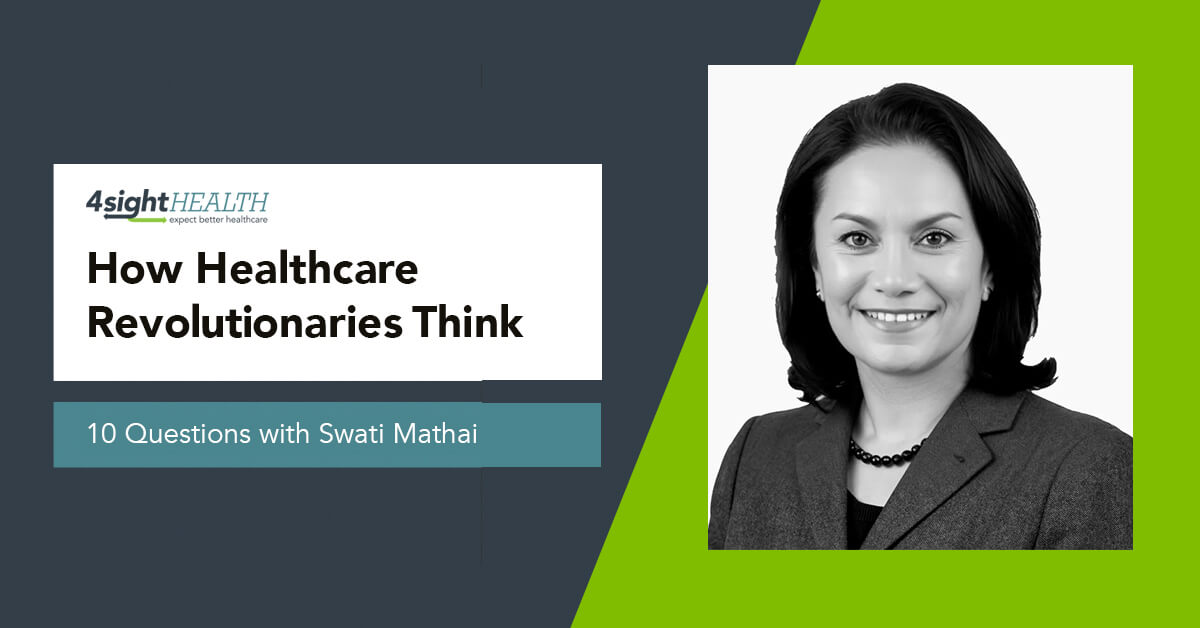November 4, 2025

How Healthcare Revolutionaries Think: 10 Questions with Swati Mathai
Welcome to the latest installment of 4sight Health’s series, How Healthcare Revolutionaries Think. Our interview series profiles healthcare instigators who believe that outcomes matter, customers count and value rules.
Open enrollment season is upon us, and no one is happy. Employers don’t like it. Employees don’t like it. Health insurers don’t like it. Medicare beneficiaries don’t like it. Medicaid recipients don’t like it. People with ACA coverage don’t like it.
Why? First of all, signing up for health insurance is a hassle. Passwords, logins, benefits design, coverage options, premium levels, copays, provider networks, dependents and more. No one would intentionally build such a byzantine system to sell or purchase anything. It makes buying a car seem like a dream.
At a deeper level, no one likes it because no one, with the possible exception of a few actuaries, knows or understands the value of what they’re selling or buying. Is anyone getting what they want? Are they paying too much? Are they paying too little? Are premiums too high? Are the benefits too skimpy? No one hits “submit,” “sign,” “send” or “accept” knowing precisely what they did or being completely satisfied with what they bought or sold.
That’s the dynamic that Swati Mathai wants to fix. Mathai is the co-founder and CEO of XO Health. XO Health, based in Alpharetta, Georgia, is a platform company that uses data and advanced analytics to make open enrollment season something to look forward to rather than dread. Specifically, XO Health uses its platform to help self-insured employers offer simplified and personalized benefits to employees.
I spoke with Mathai about employers’ reluctance to leverage their healthcare purchasing power to drive better outcomes for less cost and how digital transformation can give employers the tools they need to make better health insurance purchasing decisions for their employees.
You can also listen to my podcast interview with Mathai about how the business of healthcare defies basic economic principles, making it exponentially more difficult to fix, and how she’s applying lessons learned from rowing a scull and flying a plane to do her job today.
1. Swati, if you wrote up a definition of a healthcare revolutionary for a dictionary, what would it say?
Mathai: I’m sure most people think of it in terms of curing deadly diseases or solving big human health problems. I have a different slant on it. There’s no lack of good ideas in healthcare. It really comes down to who can actually execute, operationalize, make something mainstream. The revolutionary part might really be the ability to just get it done.
2. What kind of person can do that? What are the common traits of someone who can take an idea from the drawing board and put it in play? What does it take?
Mathai: Like Steve Jobs said, an idea is not what makes a product. There are lots of steps in between. One trait would be being data driven. Let the data make the case for you. That’s the objective side of the coin. The other side is subjective. You can’t be afraid to have hard conversations. You have to be able to say what needs to be said. You have to ask what needs to be asked. You must be inclusive. You need to be comfortable soliciting objections and then figuring out how to address and get around them. Find out what you’re up against. How do you solve for these objections? Some are perceived. Some are real. But they all count.
3. Do you have a favorite healthcare revolutionary who fits that description? Past or present?
Mathai: This probably will sound like a controversial thing to say, given everything that’s happened. But once upon a time, UnitedHealthcare was the disruptor. United was the healthcare revolutionary. There were lots of people there at the beginning who were very smart and who started looking at data to see healthcare differently.
They looked at data and figured out that not all care is delivered equally. They looked at data and asked why we are doing prior authorizations if we approve them 99% of the time. They looked at data and wondered why we’re sending someone for surgery to a place that does it five times a year instead of a place that does it 500 times a year with better outcomes. United started looking at data, saw trends and surfaced them. United was a leader in using data. There have been many twists and turns along the way since, and I won’t opine on how we got here. But once upon a time, United was David going up against the Goliaths (the Blues’ plans of the world) before United became the Goliath.
4. Do you see yourself as a David right now? A healthcare revolutionary?
 Mathai: Again, most people would think that a healthcare revolutionary is someone in the medical field solving a big medical problem like curing a deadly disease. But there is a revolutionary role to be played by the business side of healthcare. I want employers to finally harness their power to improve outcomes and lower costs. We’re trying to help them do that. If we can, the employers will be the revolutionaries.
Mathai: Again, most people would think that a healthcare revolutionary is someone in the medical field solving a big medical problem like curing a deadly disease. But there is a revolutionary role to be played by the business side of healthcare. I want employers to finally harness their power to improve outcomes and lower costs. We’re trying to help them do that. If we can, the employers will be the revolutionaries.
5. We’ve been complaining for years that employers aren’t using their healthcare purchasing power to drive better outcomes for less cost. Why aren’t they harnessing their purchasing power?
Mathai: I think many of them still don’t know they have that power, and those that do hesitate to use it. They still don’t appreciate the direct connection between what service they pay for as a covered benefit and the utilization of that service by their employees. They let providers drive what’s covered. Here’s a new drug or treatment, and you should cover it. It should be the other way around. Here’s what we’ll pay for based on the evidence, and you should provide it. Employers have the data to make informed decisions. What they decide should be covered directly affects what gets delivered. Unfortunately, we’ve created a situation where the wrong things are incentivized.
6. Maybe we’ve reached the point at which more employers will flip the script. A number of benefits consulting firms are projecting an increase in employer healthcare costs of around 10% in 2026. That’s about double what it’s been for the past few years. Two questions. Why do you think the increase is that high? And what will employers do about it?
Mathai: Most of the evidence points to greater utilization rather than price. For the past few years, it’s been price more than utilization. But this time it’s utilization more than price. That’s in part because of what I said earlier, and that’s services driving coverage rather than the other way around.
Employers have been able to mitigate 3% to 5% increases a year. They’re easier to sweep under the rug with minor salary and benefit changes. But when you get into the 8% to 10% range, you can’t cost shift your way out, especially in industries with low-wage workers or in low-margin industries. Where is that 10% going to come from? Let’s see what unfolds. It’s time to get some popcorn. There aren’t any simple solutions to buy off the shelf. Employers need to be part of foundational solutions.
A lot of employers say they want to embrace new solutions, but then they tell you to come back when you have proven ROI. It’s not going to fix itself. There isn’t a solution that can help you in every market for all your employee types on your desk with a bow on it. You’re going to have to help build it.
7. Let’s switch gears. You’ve got an undergraduate degree in biology. The last biology class I took was in high school, and we dissected fetal pigs that we pulled out of a five-gallon bucket of formaldehyde. That was safe. Did you want to be a doctor? Did your parents like all parents want you to be an M.D.?
Mathai: My mother’s a doctor. My sister’s a doctor. I was on that path. My plan was to get a degree in public health and then go to medical school. But after I took some classes in health administration and finance, I got my MPH and went on to get my MBA. Those classes changed my perspective on all of it. I really like the business of healthcare. I find it fascinating because it defies the laws of economics. Defies anything you’d expect in any other good or service that’s bought or sold. My dad’s an economist. I joke I wound up in the middle of my physician mother and my economist dad. We never lack for conversation around the table.
8. Let’s jump tracks again and talk about digital transformation. If I heard that term once, I heard it a thousand times. It’s in every press release. Everyone is doing it. What does it mean to you? When you see it or hear it, do you roll your eyes?
Mathai: I roll my eyes a lot. Everything in healthcare comes down to digital transformation, but digital should refer only to the state of data. There is so much data trapped in inaccessible forms because it’s hard-coded in claim systems, in EHR systems, right? It’s not designed to be used for all the things that you’d want to use it for. That is something we’re focused on at XO. We’re building a platform to make that data accessible digitally so you can do three things with the data: You can mine it, you can share it, and you can report on it. Data can be all those things. We’re building an underlying chassis that can do all those three things at the speed of life to make the data useful. That’s the real transformation.
9. Who gets digital transformation, and what industry sector is furthest along?
Mathai: Some payers are far along. Some providers are far along. The unfortunate part is they’re using it to enrich themselves, not their customers. When you look at the most advanced use of data analytics in the industry, it’s probably being used in revenue cycle. Or being used to increase patient volume or drive more high-margin procedures or those types of things. None of that is patient centered.
10. You seem to walk a fine line between skepticism and cynicism like we do at 4sight Health. How do you monitor yourself to stay on the right side of that line and push forward rather than the other side and just say screw this?
Mathai: I really appreciate you asking that because I don’t get to talk about this a whole lot. One core thing that keeps us on the right side is that it’s never our money. We work with self-insured employers. It’s their money. We’re stewards of their money and their employees’ money. What’s become muddled for a lot of payers right now is that they are managing their own money, and they’re managing other people’s money. That hasn’t gone so well for the other people.
Burda’s Final Brief
Like I said at the top, open enrollment season is upon us. Thousands of employers are asking employees to pick a health plan, and millions of employees are hoping to make the right choice for themselves and their families for the year ahead. This shouldn’t be that difficult. If Swati Mathai and XO Health are right, it won’t be in the future. By harnessing the power of data through advanced analytics, employers will know what their employees need, employees will know what they and their families want, and the two will work together to create benefits packages that make everyone happy and, most of all, healthy.
Swati Mathai is the Co-founder and Chief Executive Officer of XO Health, working to ensure that XO’s mission and vision are central to all business decisions and activities. Swati believes that improving the health of our population has never been more vital and sees great potential in new platforms that harness the power of digital innovation to improve care and lower costs. XO Health will address large employer’s frustrations and provide an effective care model that is currently missing in the employer-funded healthcare market.
XO Health is a health-services company focused on designing and operating health-plan/benefit solutions for self-insured employers, third-party administrators (TPAs), and brokers — using a value-based care model.





